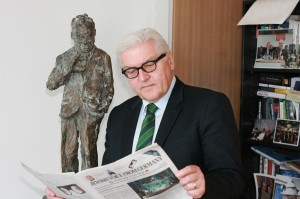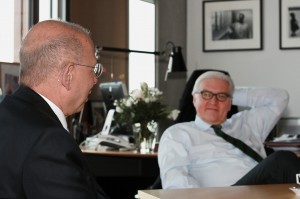Exclusive interview with the chairman of the SPD parliamentary group in the Bundestag

“Iran will not survive the impending conflagration in the entire Middle East unharmed”, says Frank-Walter Steinmeier in an exclusive interview
The success of the labor market and economic reforms of Agenda 2010 has been widely acknowledged. Will there now be an Agenda 2020?
Yes, but it will be completely different from the Agenda 2010. At the time the Agenda 2010 was developed, the greatest risk the social market economy was facing was unemployment. This coming decade, it will be the exact opposite: a shortage of skilled labor. What we need now is a policy which is able to anticipate the consequences of demographic change, to invest massively in education and professional training, to accept the fact that a healthy balance between the younger and the older generation can be maintained in Germany only by regulated immigration, and giving up the decades-old policy of piling on new debt.
Would another grand coalition at a federal level put the SPD to a crucial test?
The times of the grand coalition (CDU and SPD, 2005–2009) are behind us, not before us. We want to form a coalition with the Green Party. That was the coalition (1998–2005) that opened up this country’s society and that modernized our economy. In the grand coalition, the SPD ministers were the high performers of the administration. When Peer Steinbrück was Federal Minister of Finance, we mastered a crisis on the global financial markets that is now nearly forgotten, but resulted in our economic performance taking a southward dive of 5 percent, and all the consequences that came with it. What we did served the country well, but not for the SPD at the subsequent elections. We would rather not repeat that particular exercise.
Would a coalition with the Green Party and the Free Democratic Party (FDP) be an option?
(laughs) I’m not one to hold a grudge, but I don’t forget, either. Four years ago, I had floated that idea, but was refused as a “stalker” by the FDP, where people were drunk on the success of their poll numbers at the time. If the liberals now find themselves in adverse circumstances and are casting about for new prospects, that’s for them to decide. They don’t need my advice on this, though.
Should the SPD be part of the next government, would you be available to head a department?
Before we address that question, we first need to win the election. And I will do everything in my power to achieve that – to see a strong SPD in the next parliament, and to see Peer Steinbrück elected as chancellor. Everything else will be dealt with after the election.
In a paper, the SPD and Fatah emphasized their shared values. The Fatah salutes the armed struggle against Israel.
For many years now, I have stood for social democratic principles in Germany’s foreign policy and in our security policy. As the head of the Federal Chancellery, as Foreign Minister, and as opposition leader, I have never let there be any doubt as to where we stand: we are fully aware of our responsibilities in our foreign policy, and that includes the responsibilities we have due to our special relationship with Israel. The SPD will not change its position on the matter, and this is also my personal mission.
For nine years now, the 5+1 states have been negotiating with Tehran on preventing Iran from building nuclear weapons. Negotiations with North Korea lasted for fifteen years. They now have atomic weapons and are threatening to use them against their neighbor states. Will talks with Iran bear similar results?
Focusing only on the time that negotiations have lasted creates a false impression, because it is a way of insinuating that nothing has happened. In actual fact, we have been able to keep the global community unified – including Russia and China– in its position of increasing the sanctions imposed on Iran, year after year, as long as it pursues its nuclear ambitions. Today, there is no-one who would dispute that the sanctions are taking effect – which is the only way of opening up options beyond military means, such as the return to serious, result-oriented negotiations. But it is true that the problem has not been resolved, or let’s say it hasn’t been resolved yet.
Do you see any chance of it being resolved?
The international community is working hard to prevent Iran from acquiring nuclear weapons, and to avoid military escalation in the Near and Middle East pursuing that objective. There are no guarantees – in international politics, there are never any guarantees – but maybe right now there are slight indications that the path of negotiations is being followed with a greater sense of commitment. According to the information I was given in preparation for the 3+3 negotiations in Kazakhstan,Iran seems to be committed to continuing the process. What is decisive here is what Vice President Biden said at the Munich Security Conference and what President Obama stated, more or less at the same time, in his State of the Union Address: now is the time for negotiations. Iran is called upon to finally give up its tactical positions which only serve to prolong the process. When we look at Syria, Iraq, and Lebanon, we see that the overall situation has changed dramatically. There must be a couple of responsible leaders in those countries who understand that Iran will not survive the impending conflagration in the Middle East unharmed.
Is it conceivable that sanctions will be increased?
Thus far, the regime of sanctions has been agreed upon very carefully, and such that it is possible to increase them. When the sanctions were extended to gas and oil, it was a decisive phase. But without a doubt, this is not the last measure available.
Turkish Prime Minister Erdoğan recently equated Zionism with anti-Semitism and fascism …
Zionism has nothing to do with those terms. Fascism and its disregard for human dignity, which destroyed millions of lives in Europe and all over the world, is completely different from Zionism, which is nothing more than Jews all over the world claiming their right to a home in a state of their own – a state that the international community enabled by the United Nations passing the corresponding resolution. History forbids this type of equation, or even comparison in any form!
The German Länder are calling for the extreme-right National Democratic Party to be banned. The federal government was unable to agree on a shared position. Would not a strong, concerted effort by the Bundestag be helpful, if it were to annouce: We want to ban this party?
The SPD has unanimously and very clearly called for a new closure process banning the party to be initiated. Other opposition parties did so, too. The parties hesitating on the sidelines are the ones constituting the government. In my view, it would be more than appropriate if the parliament were to launch this petition here in the historical Reichstag building, where Otto Wels gave his speech eighty years ago against the “Enabling Act” (Ermächtigungsgesetz). This would be a very clear and important signal.
Frank-Walter Steinmeier
The politician was born in 1956. He earned his Ph.D. in Law. Steinmeier was head of the Federal Chancellery from 1999–2005. He served as Germany’s Foreign Minister from 2005–2009 and was Vice-Chancellor from 2007–2009. Steinmeier was his party’s chancellor candidate nominee in 2009 and is currently chairman of the SPD Parliamentary Group.

